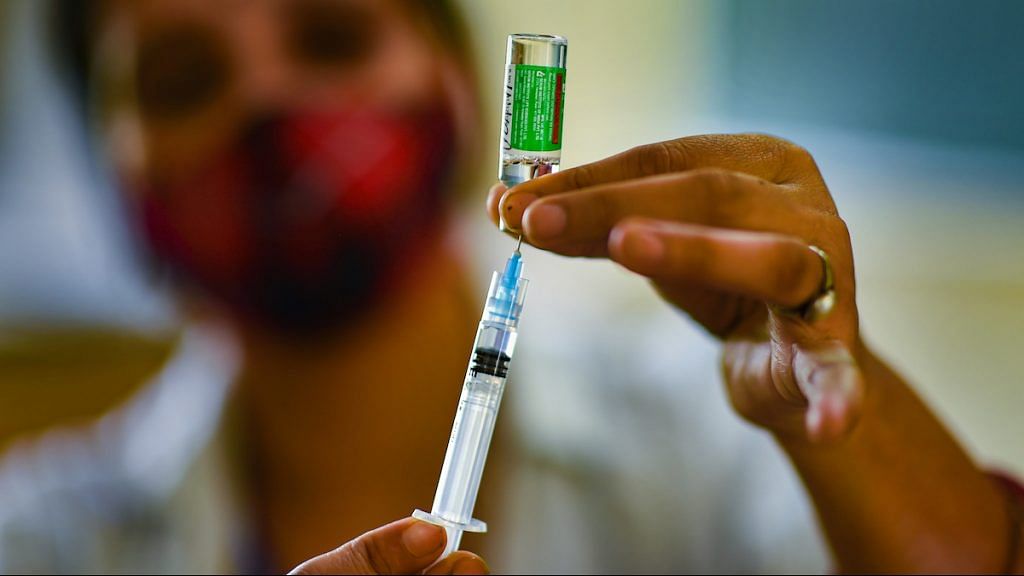Thank you dear subscribers, we are overwhelmed with your response.
Your Turn is a unique section from ThePrint featuring points of view from its subscribers. If you are a subscriber, have a point of view, please send it to us. If not, do subscribe here: https://theprint.in/
Shortage of the Covid-19 vaccine is the raging news in India over the past three months. Recently, we have seen a slew of announcements recently of enhanced production of the Covid-19 vaccines over the last few days, with Biological-E, Serum Institute and Bharath Biotech with significant volumes kicking-in from August of 2021. Interestingly all of production capacity ramp-up has been achieved by approval of advance payment of ₹6000 Cr by the Government of India towards future supply of vaccines.
Private enterprise have no incentive to invest the capital needed to drive production
But why is there a shortage of vaccines in India, a pharmaceutical power house and the vaccine factory for the world?
Let’s compare this to the thousands of life saving drugs and vaccines in the market today. Miraculously, without any government management or pre-order for millions of units, there is just enough supply to meet the demand in the market. It is the lack on incentive for private enterprise to invest towards the Covid-19 development and production capacity driving the storage in supply.
The recent request from Cipla requesting exception from governmental price restriction, as a requirement to investing an enormous $ 1 Billion towards bringing the Moderna vaccine to India is the case and point.
The government pre-order is one pretty inefficient lever to incentivize the pharmaceutical companies in India. The obvious alternative is to allow these companies to profit from their investment, which is restricted by the governmental price control of the Covid-19 vaccine. Eliminating the need for a Tsar of Covid-19 vaccines, trying fruitlessly to match supply to demand.
Increases Profit increases competition and supply
Popular media, the political environment and bureaucratic institutional memory makes price-fixing the default under any conditions of supply shortage.
With the noble intention of preventing Price Gouging and exploitation by ruthless capitalists, there is no consideration to the un-intended consequences of price-fixing. The phrase “Gouging” providing us with an extremely violent and harmful imagery in our minds, justifying the the need to avoid “Gouging” by any means necessary. Higher prices leads to increased profitability, which in turn will attract more suppliers to enter this market, increasing competition and decreasing the ability of suppliers to make extraordinary profits for any sustained period of time.
The logical argument against allowing pricing freedom will be (i) the demand for the Covid-19 vaccines being in the Billions there is bound to be shortage of vaccines even with many suppliers (ii) Most Indian will not be able to afford the vaccines, unfairly faring the reasonably wealthy compared to the millions of poor.
True, there will be supply shortage initially and this will favor the elites who may be willing to pay thousands of Rupees for their opportunity to be first in line. But these minuscule elites, about 5% of the population will be willingly subsidizing the vaccination for the larger population. Since the direct cost of manufacturing the Covid-19 is a small compared to the fixed cost (investment for R&D and production infrastructure), it will be pharmaceutical companies’ interest to reduce price and increase sales volume. It is in the business interest of the suppliers to maximize volume by decreasing price gradually.
Of course the government will have the ability to negotiate with multiple suppliers and provide the vaccines at no cost to the vulnerable population who will not be able to afford the initial high prices.
Let’s take the case of the USA which has run one of the most effective Covid-19 vaccination campaigns among large counties with 50% of the population having received at least one dose of the vaccine. Despite contributing about $3 Billion from the US federal governmental funds towards the vaccine research and development in 2020, the pharmaceutical companies were allowed pricing freedom. This lead to vaccine pricing ranging from $10 for Johnson & Johnson (not very far from the prices for private sales by Serum Institute and Bharath Biotech) to about $35 for the Moderna Vaccine.
In summary, the best approach for India to achieve universal coverage is to permit any and all credible Covid-19 vaccine suppliers to distribute in India, policy for which is in place today, and permit local manufacturers and supplier’s freedom to price for profitability. For achieving the scale of vaccinating Billions, what we need is the efficiency of markets and private enterprise. Not infective central planning with incomplete information and lack of prices to determine demand.
These pieces are being published as they have been received – they have not been edited/fact-checked by ThePrint.
